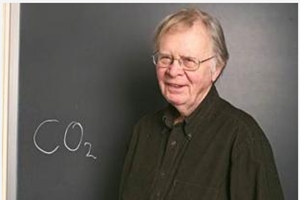
An interview with 'the father of global warming'
August 16, 2012 | Author:Freelance Writer Steven A. Edwards, Ph.D.
On August 8th, 1975, Science published a paper by AAAS fellow Wallace S. Broecker titled “Are We on the Brink of a Pronounced Global Warming?” in which he argued that the increase in atmospheric carbon dioxide occurring because of the burning of fossil fuels would result in higher global temperatures. We recently interviewed Broecker, the Newberry Professor in the Department of Earth and Environmental Sciences at Columbia University, about how warming has progressed since his ground-breaking paper, and what can or should be done about it.
AAASMC: Were you the first to warn about anthropogenic global warming in a scientific paper?
Wallace S. Broecker, Newberry Professor in the Department of Earth and Environmental Sciences at Columbia University: No, no. There were discussions about carbon dioxide and warming before that. My paper was actually to warn people that the previous thirty years of moderate cooling was due to natural periodic variations, using as evidence ice cores in Greenland--that once this was played out, the warming due to carbon dioxide would reassert itself. The paper was published in 1975 and the warming trend began again in 1976, but this was sheer luck. It turned out that the periodic cooling shown in the ice cores was not borne out by ice cores in other places, even within Greenland.
So, for two different prizes that I won, I was introduced as “the father of global warming” because of this one lucky paper I wrote that was partially wrong, instead of being known for sixty years of science. I once offered my students a $200 reward if they could find a previous reference to global warming in the scientific literature. The reward was never claimed, but a postdoc found a reference in a 1958 Indiana newspaper account of two southern California scientists who were warning about industrialization causing climate change. The scientists weren’t named, but reading between the lines, they must have been Roger Revelle and Charles Keeling (both from the Scripps Institute of Oceanography). Keeling started the CO2 readings at Mauna Loa that are always cited. I think Keeling should be the “father of global warming.”
AAASMC: So the previous thirty years of cooling have never been explained?
Broecker: No, not really. A lot of people cite volcanos or sulfate aerosols, but aerosols are really difficult to model, they bang into each other and create larger aerosols and so on, so it is hard to say for sure.
AAASMC: In your paper, you say that only carbon dioxide of atmospheric gasses can be demonstrated to be significant for climate change. Is this still true? How about methane, for example?
Broecker: Well, methane, sure. But methane and most other things that we put out into the atmosphere don’t last for very long. The CO2 that we put out today will last for centuries. The ocean will eventually take it out, but that will take a thousand years. So the effects will be with us for a very long time.
AAASMC: What do you think should or can be done to ameliorate the effects of global warming going forward?
Broecker: I’m in favor of air capture, not just sequestering carbon dioxide at power plants, but actually sucking it out of the air and burying it. Klaus Lackner at Columbia has devised a system for doing this with membranes. The membranes love to bind CO2 when they’re dry, but then it can easily be washed out (Sometimes called “artificial trees,” Lackner’s technology can reportedly remove about 1000 times more carbon dioxide from the air than could a real tree of the same size).
AAASMC: I can’t imagine who will pay for that…
Broecker: This technology won’t change the playing field for the energy companies, so some sort of carbon tax will have to be charged, when people use carbon-based fuels. Of course, the consumer will pay it. When people start feeling the real effects of global warming, they will be ready to do something.
AAASMC: If the hottest month in history, Greenland melting, droughts and the corn crop failing don’t wake people up, then what will?
Broecker: It won’t be Greenland melting; it will be difficulty in finding food. If this summer doesn’t turn out to be just a fluke, they’re going to have to start irrigating the corn, and of course that would use up a lot of our water supply, and be very expensive—food prices will go way, way up. Eventually, people will be ready to do something. It won’t happen tomorrow, I won’t be around to see it (Broecker is 80 years old) but maybe in ten or twenty years. These will be interesting times.
If not air capture, then injecting sulfur dioxide into the stratosphere might be tried (to reflect sunlight and cool the atmosphere), but that is a very risky experiment. And of course, it wouldn’t be uniform around the globe, so it would be very, very difficult to control. Very messy.
Related Links: The Earth Institute: Wallace S. Broecker bio
Credit: http://membercentral.aaas.org/blogs/scientia/interview-father-global-warming


































